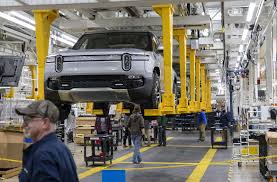The U.S. Department of Energy will lend $6.6 billion to Rivian Automotive to construct a Georgia factory that had stalled as the fledgling electric vehicle manufacturer struggled to turn a profit, the administration of President Joe Biden announced Tuesday.
It’s uncertain if the administration can finish the loan before Donald Trump retakes office in less than two months or if they will attempt to recoup the funds.
In the past, Trump has pledged to eliminate federal electric vehicle tax credits, which may total up to $4,000 for used cars and $7,500 for new zero-emission cars.
After going public, Rivian created a stir in 2021 when it started manufacturing huge electric R1 SUVs, pickup trucks, and delivery vans at a former Mitsubishi facility in Normal, Illinois.
A few months later, the California-based business declared that it would construct a second, bigger, $5 billion factory close to the town of Social Circle, some 40 miles (64 kilometers) east of Atlanta.
The R1 cars cost at least $70,000.
The business intends to manufacture R2 cars, a more affordable SUV geared toward the mass market. In Georgia, the first phase of Rivian’s Georgia facility will produce 200,000 vehicles annually, with a second phase capable of producing an additional 200,000.
It is anticipated that the plant will eventually employ 7,500 people.
However, Rivian quickly depleted its capital and failed to reach sales and manufacturing goals.
Laptops 1000The business said in March that it would put the Georgia plant’s construction on hold.
Instead, the business announced it would start building its R2 SUV in Illinois.
According to CEO RJ Scaringe, the action would save $2.25 billion in capital expenditures and enable Rivian to begin selling the R2 sooner.
In June, the German automaker Volkswagen AG announced that it would invest $5 billion in Rivian through a joint venture, whereby Rivian would share electrical and software expertise with Volkswagen.
The funds alleviated Rivian’s financial hardship.
Rivian’s larger objectives are given a lifeline with Tuesday’s news. The business stated that production will start in 2028 and has resumed plans to manufacture the R2 and the smaller R3 in Georgia.
In a statement, Scaringe stated, “With this loan, Rivian would be able to more aggressively scale our U.S. manufacturing footprint for our competitively priced R2 and R3 vehicles that emphasize both capability and affordability.”
According to the Energy Department, the loan would significantly increase the number of electric vehicles produced in the US and help Biden achieve his target of 50% of all new U.S. sales by 2030 being zero-emission vehicles.
“Rivian’s Georgia facility will enable the company to reach production volumes that make its products more cost-competitive and accelerate access to international markets, as it is one of a few American EV startups with light-duty vehicles already on the road,” the department said in a statement.
In addition to the $6 billion loan amount, the principal will also contain $600 million in interest.
Fuel-efficient vehicle and component manufacturing is made possible by low-interest loans from the Advanced Technology Vehicles Manufacturing Loan Program.
Under Biden, the program has primarily concentrated on loans to new electric vehicle battery plants. It previously assisted in funding the first manufacturing of two innovative electric vehicles, the Nissan Leaf and the Tesla Model S.
The loan program, which was established in 2007, stipulates that the loan must have a “reasonable prospect of repayment.”
The program has announced $33.3 billion in deals under Biden, including $9.2 billion for large battery factories for Ford’s electric vehicles in Tennessee and Kentucky.
The announcement on Tuesday was greeted as “yet another historic federal investment in Georgia electric vehicle manufacturing” by Democratic U.S. Sen. Jon Ossoff, who has been an outspoken advocate for solar and electric vehicle manufacturing in Georgia.
In July, Ossoff had requested support for the loan from Energy Secretary Jennifer Granholm.
Ossoff said in a statement that “economic development throughout the state of Georgia is being driven by our federal manufacturing incentives.”
Brian Kemp, the governor of Georgia, says he wants to establish Georgia as a hub for the electric vehicle sector.
Although some surveys indicate Georgia has attracted more investment in electric vehicles than any other state, the Republican Party Party has had a tense relationship with the Biden administration due to its industrial strategy.
Before the passage of Biden’s centerpiece climate law, the Inflation Reduction Act, Kemp has long maintained that firms were choosing Georgia.
Before the Biden administration, efforts were made to bring Rivian to Georgia, and according to a Kemp spokesman, “our shared vision to bring opportunity to Georgia will remain no matter who resides in the White House or what party controls Congress.” Kemp spokesperson Garrison Douglas said Tuesday.
Even as Biden steps down, the financing to Rivian has the potential to save one of the Kemp administration’s most recognizable economic development initiatives.
If Trump attempts to revoke the loan, Rivian and Kemp might be forced to justify it.
In 2022, Rivian received an incentive package from state and local governments valued at approximately $1.5 billion.
Legal challenges were filed by neighbors who challenged the development of the Georgia site.
The almost 2,000-acre (810-hectare) land was purchased and prepared by the state and municipal governments for about $125 million.
Additionally, the state has finished most of the $50 million in promised road improvements.
The Hyundai Motor Group’s $7.6 billion electric vehicle and battery complex in Savannah is being built quickly, in contrast to Rivian’s stop.
In October, the Korean automaker said that it started production in Ellabell, where it intends to hire 8,500 people.

















